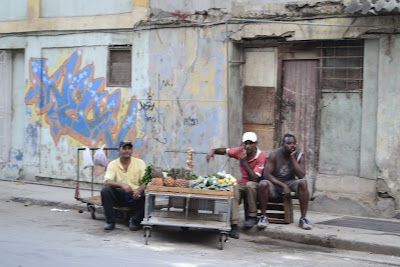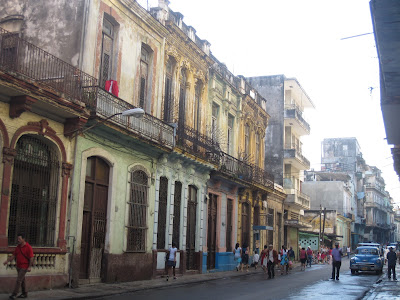Some cities seduce you from the outset. Havana wasn’t one of them. Which was unfortunate, because it was to be our home for two weeks, while we studied Spanish at a language school. In our new neighbourhood, Habana Centro, there was no sign of the beautiful colonial mansions, lively salsa bands, and waiters serving mojitos in bars once frequented by Hemingway that is the stuff of tourist brochures. Instead we found ourselves dodging dog shit in dimly lit streets where once grand homes were now badly decaying.

But I began to see a different side. Centro pulsed with life 24 hours a day – locals clustered around domino tables on street corners as players slapped tiles down triumphantly, vendors loudly hawked their wares, neighbours yelled the latest gossip across balconies, people danced in their living rooms. This was the real, unsanitised Havana – noisy, chaotic, and constantly entertaining. There was no better place to watch it all unfold than with a Cuba Libre on the balcony of our casa particular.
I watched two girls in tiny denim shorts and tight singlet tops strut past on their way out salsa dancing. A weary vegetable seller pushed a low wooden cart, crying “Ajillos, naranjas, malanga”, as if he never wanted to see another orange in his life. An elderly woman in a revealing white nightie, her hair in rollers, stood on the balcony next door and called her grandson - who was nowhere to be seen - for dinner.
The noise was constant. It seemed doorbells were only there for decoration – locals would just stand on the street and yell for people until they got a response. Usually the woman inside wouldn’t emerge, but a rope with a door key on the end, or a bucket of food attached would be lowered down from above. There was a real sense of community.
It gave a good insight into how hard daily life is for many Cubans. Below us, people queued for bread at the bakery, ration books in hand as if in wartime. It’s been that way since the early ‘90’s, when the collapse of the Soviet Union meant Cuba lost its trading partners, and a “Special Period” of near starvation for many people began. Today, rice, sugar, oil, beans, bread and salt are still sold on government rations. The monthly allowance lasts most families 8-10 days.
Havana’s housing crisis was obvious. The apartment opposite had been split in four, vertically and horizontally. An old man appeared to be floating through the glass window at the top of the high front door – but was merely standing on the extra floor which had been added. People came and went constantly - a young couple with a baby, a teenager on roller blades, an old man and a dog – often headed for the Malecon, the nearby seaside boulevard, to escape the cramped conditions.
Their infrastructure may be in decay, but Cubans are house proud, and inside most homes were spotless. Every morning across Centro women brusquely brushed the marble floors of their crumbling homes with gallons of water that poured into the street.
Their infrastructure may be in decay, but Cubans are house proud, and inside most homes were spotless. Every morning across Centro women brusquely brushed the marble floors of their crumbling homes with gallons of water that poured into the street.
There were many kinds of transport, none of them modern. 3-wheeled bici-taxis cruised up and down the street, some fitted with stereos blaring Eurotrash techno. Opposite us, a grease-covered man, his stomach escaping from brown overalls, had given up on trying to repair his brown Ford set on blocks. And in a Flintstones-esque moment, half a dozen whooping kids peddled a small jeep made from the frame of a bici-taxi.

The tourist brochure Havana did exist, in restored Habana Vieja, but it didn’t feel real. There, Caribbean women in bright headgear turned themselves into caricatures with enormous cigars drooping from their lips, charging for photos. Persistent touts tried to force you into their restaurant. Tour groups thronged the cobbled plazas, snapping photos like their lives depended on them.
Centro came without the infrastructure or amenities, but it also came without the hassle – and in time we were treated like part of the neighbourhood, greeted by vegetable sellers reclining on our doorstep or bici-taxi drivers who knew we walked everywhere.
We were staying in a casa particular run by Julio, a paediatrician, and his wife Elsa. It must be the only country in the world where a Professor of Paediatrics had to open his home to tourists to stay afloat. (As a doctor Julio earns roughly the same wage as anyone else in Cuba – about US$25 a month.) They have 2 casas, and we stayed at the home of Elsa’s parents: an oasis of high ceilings and garden patios, its walls covered in Cuban art. Gruff old granddad often joined us on the balcony, and we’d watch the world go by in comfortable silence.
Julio says he wouldn’t live anywhere else. “It’s a poor area, it’s not very well conserved, it’s messy… but I like it,” he told me. “Some days I feel like I’m living in a reality show. Neighbours are always stopping to gossip. Just today someone told me how a husband of someone they know has run off with another woman. It’s full of life. You never get bored.”









No comments:
Post a Comment